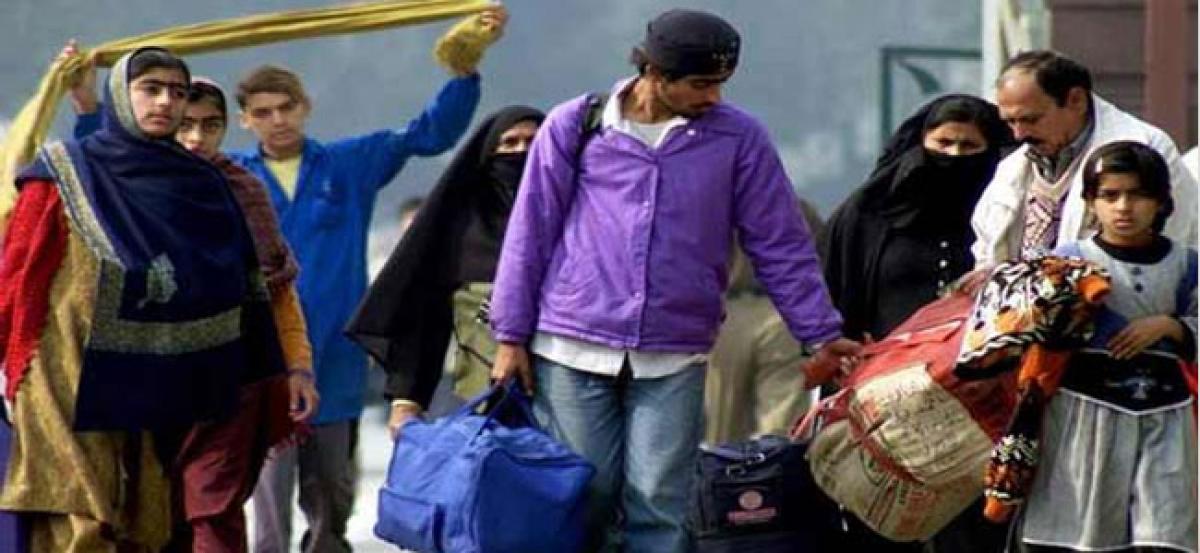Live
- Chanchalguda Jail Officials Say They Haven't Received Bail Papers Yet, Allu Arjun May Stay in Jail Tonight
- BJP leaders present evidence of illegal voters in Delhi, urge EC for swift action
- Exams will not be cancelled: BPSC chairman
- Nagesh Trophy: Karnataka, T.N win in Group A; Bihar, Rajasthan triumph in Group B
- YS Jagan condemns the arrest of Allu Arjun
- Economic and digital corridors to maritime connectivity, India and Italy building vision for future, says Italian Ambassador
- SMAT 2024: Patidar's heroics guide Madhya Pradesh to final after 13 years
- CCPA issues notices to 17 entities for violating direct selling rules
- Mamata expresses satisfaction over speedy conviction in minor girl rape-murder case
- Transparent Survey Process for Indiramma Housing Scheme Directed by District Collector
Just In

Pakistan was essentially created to protect the religious and economic rights of Muslims who were a minority before the partition of the Indian subcontinent in 1947.
Karachi [Pakistan]: Pakistan was essentially created to protect the religious and economic rights of Muslims who were a minority before the partition of the Indian subcontinent in 1947. But since the country's inception, new minorities have been created and Islamabad keeps finding new ways to torment them.
In an article for the New York Times, well known author and columnist Mohammed Hanif claims Pakistan has a poor record of protecting its religious minorities.
Taking the case of the Ahmadiya community in particular, who insist on calling themselves Muslims, he says mainstream Muslims treat them as the "worst form of heretics."
Hanif, who is the author of novels "A Case of Exploding Mangoes" and "Our Lady of Alice Bhatti," says, "You would think that government, law enforcers and the courts would do something about such sustained acts of brutality.."
He says that more often than not, he hears of incidents where the Ahmadis are put on trial for committing some form of blasphemy, because as he says, "under the law, repeating something blasphemous can itself constitute blasphemy."
He recalls one newspaper report, as saying that some men were put on trial and sentenced to death for attempting to remove religious posters that incited hatred against Ahmadis from a wall.
"The prosecution argued that since the posters were religious, removing them was an insult to the Prophet Muhammad," he said.
The Ahmadi (or Ahmadiyya) sect is a reformist movement founded by Mirza Ghulam Ahmad toward the end of the 19th century in the city of Qadian, in what is today the Indian part of Punjab.
Ahmad claimed to be the incarnation of a Messiah promised in Islamic holy texts. That challenged the mainstream Muslim belief that Muhammad is Islam's last and final prophet. Ahmad was accused of being an agent of the British Empire.
There are no reliable statistics about the number of Ahmadis in Pakistan today. Estimates range from 500,000 to four million.
Last week, Captain (Retired) Muhammad Safdar, the son-in-law of deposed prime minister Nawaz Sharif, demanded that the Ahmadis be banned from joining the armed forces. He also demanded that a physics department of a university in Islamabad be renamed because in 2016 it was named after Abdus Salam, the only Pakistani Nobel laureate.
The Pakistani government had already taken close to four decades to name anything after Mr. Salam, a theoretical physicist, because he was Ahmadi. It appears that not a single parliamentarian spoke up against Safdar's diatribe.
Earlier this month, Parliament changed the oath that Pakistanis are required to take to get a passport or run in an election.
A standard version of the statement goes: "I hereby solemnly declare that I consider Mirza Ghulam Ahmad Qadiani to be an impostor nabi and also consider his followers, whether belonging to the Lahori or Qadiani group, to be non-Muslims." (Nabi means prophet.) Language in the election law was changed from "I solemnly declare" to "I believe."
There was a public uproar over the change, including accusations that the government was going soft on Ahmadis. Parliament promptly backtracked, saying it was a clerical error.
The word "Ahmadi" is hardly even used during debate in parliament. We prefer to call Ahmadis "Qadianis," meaning from Qadian. Ahmadis consider the word derogatory.
Hanif claims in his article that Ahmadis went from being treated as zealous reformist Muslims to non-Muslims to kafir, or heretics - worse even than Hindus or Jews.
"In the mid-1980s, a decade after Ahmadis were declared non-Muslims, another set of laws forbade them to act like Muslims," he adds.
He talks of hearing about Ahmadis not getting jobs, being thrown out of shops or business meetings, and adds that one of his friends has even told him that Ahmadis are treated better than Shias.

© 2024 Hyderabad Media House Limited/The Hans India. All rights reserved. Powered by hocalwire.com







